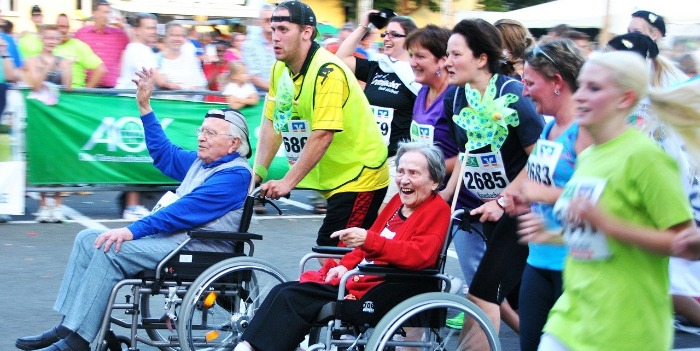What is ableism?
Have you recently heard the term ‘ableism’ but aren’t quite sure what it means? In this article, I explain what ableism is and how it can affect people’s wellbeing. I also share some tips for addressing ableism and avoiding it.

What is ableism?
Let’s start by exploring what ableism is. Ableism describes discrimination and prejudice against disabled people in favour of non-disabled people. It can be intentional or unintentional. For example, by not making a workplace environment accessible for wheelchair users. Or, by asking personal questions about a person’s disability.
Like other types of discrimination, ableism is a problem in our society and culture. People may be completely unaware of the impact of their words or actions. But, it can have a negative impact on those who experience it.
How can you tell if someone is ableist?
Discrimination can happen in many different forms. It can range from very aggressive and harmful actions to more subtle interactions. Here are some examples.
Physical
- Lack of compliance with disability laws.
- Inaccessible designs, such as buildings with no wheelchair access or disabled toilets.
Verbal
- Telling someone to change their mindset or “not to become their disability”.
- Talking to a disabled person like they’re a child.
Psychological
- Viewing a disabled person as an inspiration for doing typical things like having a career.
- Not understanding or listening to a disabled person’s experiences.
- Assuming a person is faking or exaggerating an invisible condition or disability.
Organisational
- Refusing to adjust a workplace/educational setting for someone with a disability.
- Ignoring/pretending the disability doesn’t exist.
How does ableism affect people’s health and wellbeing?
We all deserve the same opportunities in life. But, ableism can prevent some disabled people from having the same opportunities as non-disabled people.
This can have a negative impact on disabled people’s physical and mental wellbeing. For example, there’s evidence to show it increases feelings of stress and depression.
It can also affect disabled people physically. For instance, some disabled people are not able to take part in activities or events that have not been adapted to meet their needs
There can be social drawbacks too. Research suggests that disabled people have less job opportunities than non-disabled people. Or they might be prevented from taking part in certain activities because of their disability.
What can you do to prevent ableism?
It’s important to see people as individuals and to not define them by their disability.
Here are some ideas to challenge your own preconceptions, and encourage a more inclusive environment.
- Start by looking at your own behaviour. Ask yourself – would I ask this question to someone without a disability? Do I need to know this information?
- If you’re an employer, consider the office space and those who will be using the area. How can you make it more accessible?
- If you visit a place which isn’t accessible to disabled people, challenge it or make a complaint.
- If you’re planning an event, make sure the arrangements accommodate disabled people.
- Stop using ableist language in everyday conversations.
- If you’re not disabled, don’t use facilities for disabled people (such as parking spaces, toilets).
- Recognise that disabled and non-disabled people are equal.
- Listen and appreciate the views, needs and opinions of disabled people.
How can you spot and avoid ableism and ableism language?
Here are five tips for avoiding ableism.
1. Learn about ableism
Educate yourself about disability issues through conversations, books, podcasts, or social media. Talk about and share your learnings with friends, family, and your workplace.
2. Focus on accessibility
Make your environment or content accessible for people with disabilities. For example, by adding text captions to videos. Or by removing barriers for people with physical or learning disabilities.
3. Include, don’t exclude
Interact with and include disabled people. Learn about their perspectives and opinions.
4. Don’t assume
Don’t make assumptions about someone’s ability based on their disability.
5. Challenge ableism in your own environment
Highlight accessibility challenges. Aim to make your own events/plans as accessible as possible.
-
Sources Sources
- Access Living. Ableism 101: what it is, what it looks like, and what we can do to fix it. www.accessliving.org, accessed August 2022
- Disability and ableism. Scope. www.scope.org,uk, accessed August 2022. https://www.scope.org.uk/about-us/disablism/
- What counts as disability discrimination. Citizens Advice. www.citizensadvice.org.uk, accessed August 2022
- Inciting legal fictions: disability’s date with ontology and the ableist body of the law. Campbell FK. Griffith Law Rev 2001;10:42–62
- Agaronnik N, et al. Exploring issues relating to disability cultural competence among practicing physicians. Disability and Health Journal. 2019 Jul;12(3):403-410. doi: 10.1016/j.dhjo.2019.01.010
- Hackett RA, Steptoe A, Lang RP, et al. Disability discrimination and well-being in the United Kingdom: a prospective cohort study. BMJ Open 2020;10:e035714. doi: 10.1136/bmjopen-2019-035714
- What counts as disability discrimination. Citizens Advice. www.citizensadvice.org.uk, accessed August 2022
- Disability pay gaps in the UK: 2021. Office for National Statistics. www.ons.gov.uk, accessed August 2022
- Disability discrimination at work. ACAS. www.acas.org.uk, accessed August 2022
- Inclusive language: words to use and avoid when writing about disability. GOV.UK. www.gov.uk, accessed August 2022
About our health information
At Bupa we produce a wealth of free health information for you and your family. This is because we believe that trustworthy information is essential in helping you make better decisions about your health and wellbeing.
Our information has been awarded the PIF TICK for trustworthy health information. It also follows the principles of the The Information Standard.

More general health advice articles
Did you find our advice helpful?
We’d love to hear what you think. Our short survey takes just a few minutes to complete and helps us to keep improving our healthy lifestyle articles.
Legal disclaimer
This information was published by Bupa's Health Content Team and is based on reputable sources of medical evidence. It has been reviewed by appropriate medical or clinical professionals and deemed accurate on the date of review. Photos are only for illustrative purposes and do not reflect every presentation of a condition.
Any information about a treatment or procedure is generic, and does not necessarily describe that treatment or procedure as delivered by Bupa or its associated providers.
The information contained on this page and in any third party websites referred to on this page is not intended nor implied to be a substitute for professional medical advice nor is it intended to be for medical diagnosis or treatment. Third party websites are not owned or controlled by Bupa and any individual may be able to access and post messages on them. Bupa is not responsible for the content or availability of these third party websites. We do not accept advertising on this page.








